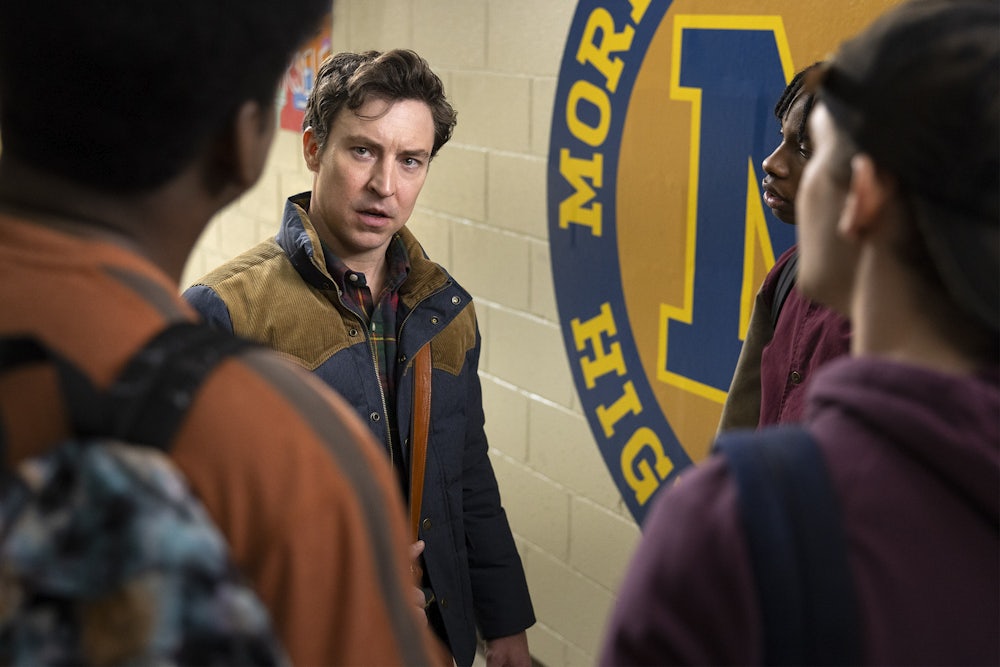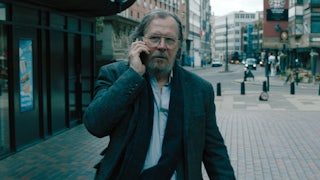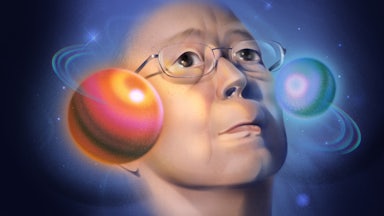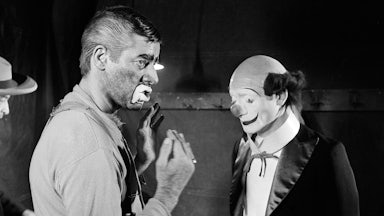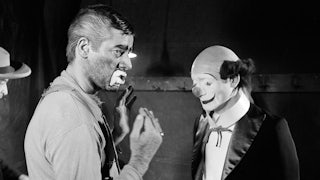“Woke mind virus” is a pretty funny phrase. It wasn’t meant as a joke when Elon Musk first started using it in 2021. If anything, the utterly dire seriousness with which its wielders intone it makes the phrase even funnier. It sounds ridiculous on the tongue, out of place in any conversation that isn’t held among the internet-poisoned. Imagining a thoughtful or intellectually rigorous discussion about the state of ethics, injustice, or morality in the present cultural moment that earnestly welcomes a neologism like “woke mind virus” is like imagining a primary care physician gently and empathetically taking your hand and delicately breaking the news that you’ve been diagnosed with “the cooties.”
It’s a silly phrase for silly people, a joke because the person who says it is a joke. So while Musk and Bill Maher and Ron DeSantis and Jordan Peterson endeavor to rid the world of this virus, the rest of us are left to live in a world defined by this imaginary culture war. At stake, mainly, is a kind of crass generational conflict. The olds don’t understand the youngs—their language, their priorities, the way they feel free to inhabit the world, the way they feel free to discard existing ways of inhabiting the world. This reads as a threat, and so rather than learn and coexist—offer and accept, in return, the pronouns of a stranger—they respond with force, with fear, and with desperation. There’s certainly nothing funny about this.
But that doesn’t mean TV comedies haven’t been trying to figure out how to make us laugh about it. Perhaps because “wokeness” is an insurgent culture, a novel thing, the first impulse has often been to mock its perceived excesses. Whether from outside its generational framework or within, many shows have taken the position that what might be funny about all of this is its inherent preposterousness. Even those who naturally favor the politics of these newer social movements still feel compelled to distance themselves, to lightly rib the “woke” agenda to prove their reasonableness. The Other Two is an epic about two empty-souled millennials adrift amid all this new sincerity. Hacks makes a meal out of the folly nestled within all the performed wisdom of its younger characters. Search Party—probably the most fine-grained of these attempts—lightly satirizes the knee-jerk cultural mores of its leads while building a much more complex portrait of millennial anxiety, precarity, and malaise. The Chair is about the cancellation of an irascible but well-meaning English professor by a woke mob of foolishly shortsighted students. Lucky Hank is about the cancellation of an irascible but well-meaning English professor by a woke mob of foolishly shortsighted students.
FX’s new comedy series English Teacher, is, technically, sometimes, also about the cancellation of an irascible but well-meaning English teacher by a woke mob of foolishly shortsighted students. But not really. In the series, created by and starring the internet-famous comedian Brian Jordan Alvarez, Gen Z high school students are constantly taking videos of adults, trying to post them doing embarrassing things, trying to catch them in violation. They police terminology, they experiment with drag, they wield therapy-speak like a sword, they file complaints—they exhibit all the telltale signs of the “woke mind virus.” But they’re also strangely open, unsettlingly comfortable in their own skin, transparently people underneath the scrim of caricature. What’s so wonderful about Brian Jordan Alvarez’s approach to the much-hyped discourse of wokeness, of Gen Z idiosyncrasy, is that it comes from a place of both fluency and recognition. Alvarez is a millennial, and his jokes about his junior generational neighbors are intimate, knowing, or, at least, self-aware about their own ignorance. Alvarez may be puzzled, but he isn’t afraid. English Teacher takes everybody seriously. And despite that, probably because of that, it is very, very funny, indeed.
English Teacher works fast. This is true of how quickly the pilot sets up the stakes of the series, but it’s also true of the show’s default style. Jokes fly with speed, characters barely enter the frame before they drop a one-liner and leave, nobody has any time to stop and think. That there’s a lot—maybe too much—to keep track of is both the show’s thesis and its signature aesthetic feature. We meet our hero, Evan Marquez (Alvarez), as he’s already late for work at Morrison-Hensley High School in suburban Austin, Texas, and we run into each member of our extraordinarily charismatic and varied ensemble as he does: Evan’s optimistic and insecure best friend, Gwen (Stephanie Koenig); conservative crank gym teacher Markie (Sean Patton); stoner guidance counselor Rick (Carmen Christopher); and beleaguered Principal Moretti (Enrico Colantoni).
In The West Wing, Aaron Sorkin crafted his trademark workplace narrative between big meetings where everyone talks over each other and brisk “walk-and-talks,” in which two characters work out their issues on their way to the big meetings where everyone talks over each other. Alvarez stages lots of those big meetings. Cafeteria lunches, class discussions, after-school book club meetings—these scenes are often frenzied set pieces, with 30 Rock–levels of joke density. But, instead of walk-and-talks, English Teacher stitches itself together with scenes that take place between two people, each on their way somewhere else. Stolen asides in the hall, quick duck-ins to the principal’s office, confabs in between class periods. If The West Wing’s style was about a big, unwieldy group of people marshaling all their energy to common purpose, English Teacher is about a big, unwieldy group of people whose energy is flying all over the place. Whatever the mission is, whatever it was, the goal is just to get to the next period.
What we soon learn is that Evan is in trouble. During the last school year, he apparently kissed his then boyfriend, Malcolm (Jordan Firstman), in front of a class of students. One of those students, the child of an ultraconservative local business owner, has since graduated and come out as gay himself. His family blames Evan for this undesirable turn of events, and so they’ve asked Principal Moretti to fire him. By the end of the pilot, Evan’s out of danger, but with a new mandate from the district that he be forbidden from dating co-workers. The sudden arrival of a new, hot history teacher, Harry (Langston Kerman), then, sets up a season’s worth of slapstick social scenarios.
But the will-they-won’t-they between Evan and Harry is, at best, a minor thread in this incredibly self-assured first season. The show’s real interest is split between the faculty lounge and the classroom. Specifically, it’s about the question of control. What happens when teachers are teaching students who want to be teaching their teachers? In a knockout midseason episode called “Kayla Syndrome,” Kayla, a student in Evan’s class, tells him that she suffers from a disease called “asymptomatic Tourette’s,” a form of Tourette’s syndrome that features none of the symptoms of Tourette’s and is only self-diagnosable. Despite the obvious silliness of this, Evan finds himself alone on an island of incredulity. When he asks for clarification, another student steps up to defend Kayla by describing, in a condescending, sing-songy tone, what Tourette’s is. Evan interrupts her by saying, “I know what Tourette’s is.” And the girl replies, “Sounds like you’re halfway there, and you’re taking the opportunity to be educated, which is … honorable.” When he accidentally says something, later in the conversation, that upsets the class, Kayla herself replies, “You can’t blame people for making really huge mistakes when they haven’t learned the etiquette.”
This might all read as boilerplate “woke mind virus” satire, but Alvarez takes the time to unravel it. After visiting Evan’s class to help him make sense of what’s happening, Markie immediately realizes that it’s an elaborate negotiation between two former best friends who seem to be moving in different directions on the social ladder. Kayla’s asymptomatic Tourette’s is a ploy for attention; her friend’s authoritarian defense of it is a ploy to steal it back. Once you understand the context, it’s easier to listen, to have empathy, to not reject something that seems so unfamiliar as to be nonsensical. Markie doesn’t have wisdom about this because he’s a right-winger who’s dismissing these kids as vapid, indulgent morons; he has wisdom about it because he pays attention to his students, what they’re feeling, how they’re doing, the language they use to express pretty universal, even normie, hopes and dreams and fears. Markie, of all people, is able to just accept the terms and move on.
The wisdom of the kids is a recurring theme. In one episode, in defiance of the principal, the football team does a full-on drag show instead of the traditional Powderpuff game cross-dressing; one student creates an online ruse in order to convince a teacher to take her workplace fashion more seriously; Evan gets more than one pep talk from different members of the student book club. An easy thing to satirize is the preternatural confidence of zoomers about their own place in the world; it’s a harder thing to admire. Sure, the students often behave in vapid or counterproductive ways, but so too do the adults. English Teacher is smart enough to know that it should marvel at, rather than mock, what it doesn’t understand.
The students’ seemingly constantly shifting terminologies and fluid explanations for the world are played for laughs sometimes on English Teacher, but they also contribute something unique that alters the narrative world of the show. To the burnt-out millennials who work in it, the landscape of the contemporary high school can seem to move at too hurried a pace, becoming frustratingly unreadable, making outsiders of even earnest allies over the span of a day. But that continual remaking also provides a vision of possibility to Evan and his colleagues. A lesser show might take the position that all of this linguistic and bodily self-determination has resulted in a world where nothing means what it used to mean, and so, as a result, nothing means anything anymore. But English Teacher takes a cue from its Gen Z ensemble—the uniformly outstanding student cast functions almost like a Greek chorus when they show up—and it imagines that, in a world where nothing means what it used to mean, anything can mean anything. People can change, people can grow, people can become themselves in unexpected ways. Who said it was a bad thing for a teacher to learn from their students?
There’s a surprisingly touching moment in the first episode of the show, again between Evan and Markie. They’re talking about the kiss between Evan and his boyfriend that sets all of this in motion. (It’s worth noting that the villain in this scenario, very plainly, is not a shiftless millennial or a TikTok-obsessed zoomer, but a panicked parent, the only one trying not to come to terms with reality.) Evan shouts in exasperation, “I didn’t turn her son gay,” to which Markie replies, “Well, are you sure about that?” Evan reads this exchange the way it might often be written, that Markie’s homophobia has clouded his judgment. “It doesn’t work that way, Markie. You can’t turn people gay,” Evan says. But then Markie pulls out yet another unexpected nugget of wisdom: “I’m not saying you did it on purpose, but, you know, he sees you being you, and he thinks, that’s how I wanna be.” He’s talking about education, not as a mode of instruction but as a process of mutual recognition. It’s a clever inversion of a common script. And it gives us a fitting prologue to a show that’s never saccharine but often quite sincere about its belief that the kids are alright.
